Believe it or not, I don’t consider myself to be someone who has a lot of “favorites” when it comes to media.
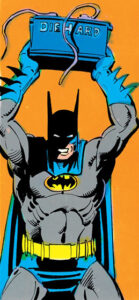
And look, I know that sounds wild. I mean, if I’m known for literally anything, it’s having a favorite. It’s defined my public-facing career, and I’ve never held back from announcing it as loud and often as I possibly can. I’ve also admitted to finding myself locked into the very binary pattern of thinking where I don’t like this (New Teen Titans, Exaclibur, Will Eisner) because that is so obviously the same thing but better (X-Men, Justice League International, Jack Cole). I’ve even devoted a pretty significant portion of my life to ranking various things from best to worst, so if there’s one thing I’m very well equipped to do, it’s decide that something is the best.
But here’s the thing: If I say something is the best or the greatest of all time, then to me, that feels like I’m making an objective determination, even it’s absolutely based in my own opinion. Pluto is objectively better than Watchmen, Identity Crisis is objectively the worst comic book ever printed, “Chain of Command Part 2” is objectively better than any other episode of Star Trek: The Next Generation, especially the one where the Enterprise runs across a planet full of Space Irish Stereotypes and immediately drops them off into a forced breeding program because they’re horny enough to balance out the neighboring planet of asexual clones. That stuff feels obvious to me; you just look at all the evidence, think about it for a minute, and make the call, and if you give me literally any amount of time, I can fill it with my reasons why. I’ve been doing it for years.
Despite their absolutist connotations, though, “best” and “worst” also feel very mutable. Most forms of media are still going on, after all, so Magnum TA and Tully Blanchard’s “I Quit” match from Starrcade ’85 is only the best professional wrestling match of all time for now. There could be a better one tomorrow. Then that new information means that it’s easy to re-evaluate the list you keep in your head, a thing that everyone does and that is totally normal and not a sign of my need to categorize and sort things with a Tetris (best puzzle game of all time)-like precision. Throw in things like changing attitudes, revelations of new information, how influences are traced back through pop culture, new takes on old ideas, and whatever mood you happen to be in when you make that allegedly objective call, and the idea of a best and a worst have a perfectly acceptable lack of permanence. If nothing else, I’m not the same person that I was ten years, five years, three weeks ago, so whatever information I had that led to calling Amazing Spider-Man #33 the best comic story of all time could easily be out of date the next time I think about it. I’m always going to have more information and experience now than I did then; that’s just how time’s arrow (worst of the two-parters, tbqh) works.
Is it Impulse #3, G.I. Joe #21, or Multiversity: Ultra Comics that’s the best single-issue story of all time? I don’t know, dogg, which one did I read last? Which one did I read when I was a kid and just figuring out how storytelling worked? Which one taught me the most about what you can do with a single unit of storytelling? Which one did I read as an adult and find myself going back to over and over to just marvel at the craft? They’ve all got a claim on it, and I don’t think either of them is the wrong choice. Bests are just the best right now.
If I say something is my favorite, though, it feels both deeply personal and absolutely final in a way that determining that “objective” best just doesn’t. I can justify a best or a worst all day long (at, I should add, an extremely reasonable rate), but no matter how much I might believe that what I’m saying is correct and true, I always understand that there’s a possibility of changing my mind. A favorite, though… that, I’m invested in. It’s the one that speaks to me, and while I might not be the same person I was when I started writing this last year, I do feel like there’s something to the idea that our favorites are connected to the core idea of who we are.
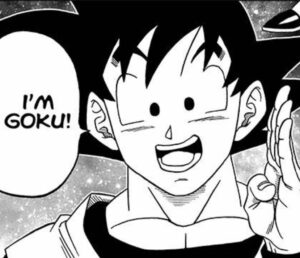
Maybe that’s just the feeling I have as someone who’s been professionally obsessed with pop culture for the past 20 years (with a pretty strong amateur record before that), and maybe it seems silly to tie in the idea of who you are to the things you like, but at the end of the day, that’s what you are, right? We’re all at least partially a collection of opinions, likes, dislikes, thoughts, and feelings about what we encounter every day, and in a world where we encounter media at a rate that a person a hundred years ago could never even imagine, that’s going to matter whether you think it’s lowbrow or not. The version of me that would’ve existed in 1898 probably would’ve liked Dracula as much as I do, but he never even heard of Goku. Meanwhile, I’m over here thinking about that dude all the time, and that has to make some kind of difference. Goku, I mean. Not my 19th century temporal doppelgänger. I’ve literally never thought about him until just now while I was writing that metaphor, and my only real opinion is that I hope he had some old-timey Bible-ass name like Ephraim Fearsgod Railroad IV.
On top of that, there’s the fact that I’ve built my career and, in a lot of ways my life, around talking about the things I like and don’t like and explaining why. In those 20 years, I’ve gotten a very well-deserved reputation for hyperbole, because I don’t mind throwing around “best” and “worst” for all the reasons listed above. I very, very rarely say something’s my favorite, however, because when I do, I want that to mean something. I want it to be clear that this is as much about me as it is about the work itself, and that it’s not a declaration that I take lightly. It’s why I’ve only ever said that one comic, Jack Staff, is “my favorite comic book.” That means something to me, and because of that, I want it to mean something to the people who care what I think about these things.
As a result, well, it’s like I said. I don’t really have a lot of favorites when it comes to pop culture. I’ve got a favorite character, a favorite comic, and a favorite song — which I also believe to be objectively the best piece of music ever recorded, so that was an easy one — but I don’t think I have have a favorite TV show or a favorite movie or a favorite book. I like Star Trek: The Next Generation a lot, obviously, but do I like it more than The Prisoner? I have a Sailor Moon tattoo and I’ve spent a lot of time on that show, but I haven’t gone back to it like I’ve I’ve watched episodes of Batman: The Animated Series over and over again. Does Homestar Runner, which literally changed my speech patterns, count as a TV show? Does Dimension 20, the thing I put on now whenever I need something I love to play in the background? I will spend nine to twelve of my limited hours on this planet watching the entire Lord of the Rings trilogy in its entirety at the drop of a hat and I think they’re basically perfect, but would I say they’re my favorite movie when Speed Racer and Rumble in the Bronx are in the mix? Does WrestleMania X-Seven mean as much to me personally as King of Trios 2012? I don’t know. I’ll rank those things and sort them and assign little numbers in my head, but figuring out which one I connect with so deeply that it’s capital-letter My Favorite is, to me, a task so daunting that I can’t even begin to start trying.
And if I do, am I willing to share that, a feeling about media that feels that personally connected to who I am, with a bunch of strangers on the Internet? Do I want to give you something that’s not just the result of expertise and critical thinking, but that connected to me as a person? Will y’all even understand what I mean when I say something of that magnitude? When I say that Batman is my favorite character, I mean Batman is my favorite character, but does anyone get why I think that’s very different from saying that Spider-Man is the best super-hero, a subtle distinction that I am fully aware exists only in my brain?
Because I need it to matter, at least a little bit. As someone who believes that we are what our opinions make us, I need you to understand what it means when I give that title of “favorite” to something. It doesn’t mean it’s the best, it doesn’t mean I won’t change my mind about it at some point, and it doesn’t mean that I can’t justify it in a way that I can with those more “objective” declarations. But it does mean something, and it means something to me in a way that nothing else does.
All of which is to say that I need you, the person reading this, to understand that what I’m about to say doesn’t come lightly.
I think Persona 5 might be my favorite video game.
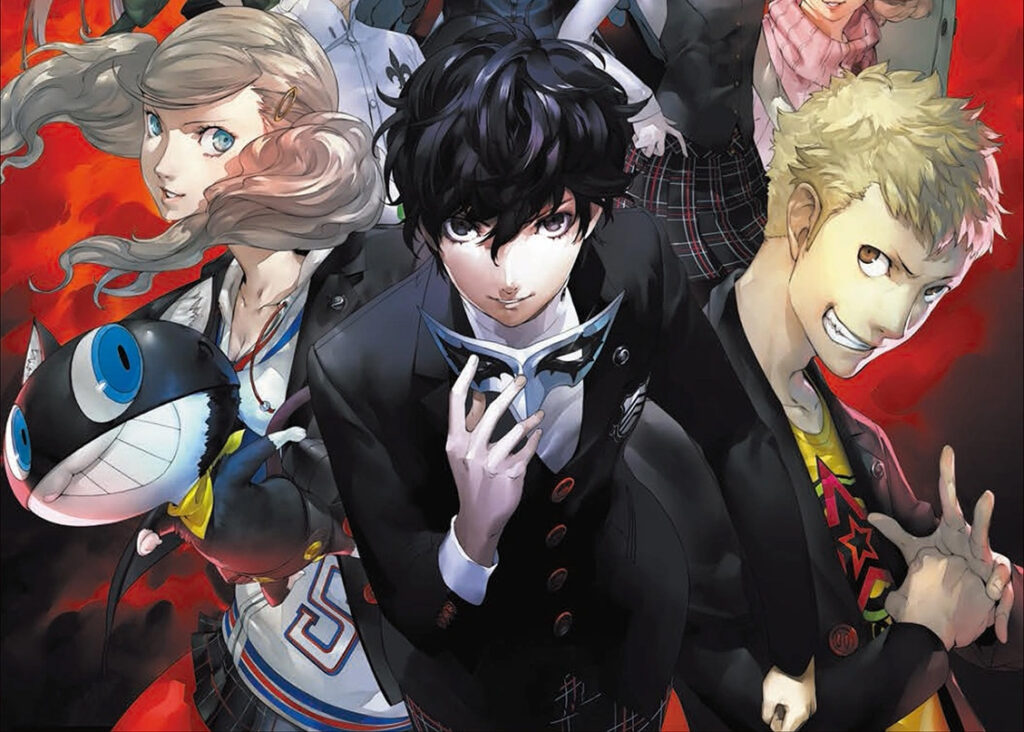
Yes: All of that was an introduction to me talking about a video game. It’s my website, I can do what I want.
I’ve been thinking about this for years now, ever since I first played through the regular, non-Royal version (Persona 5 Peasantry) in 2019, and I keep coming back to the conclusion that for some reason, I love it in a way that I don’t love any other game, even the ones that I’d consider to be objectively better. It is, for some reason, my favorite.
And like… it shouldn’t be, right?
Don’t get me wrong, it’s a great game. Nothing about it is poorly made, and while there are a few things that are… let’s just call them ill-considered, it’s generally a fantastic game with some truly amazing character designs and a great aesthetic. That’s actually what kept me coming back to it at first, I kept seeing Game Maker’s Toolkit and Design Doc videos about how great all the visuals were, and the transition into the pause menu alone was enough to be a very specific favorite UI element (ugh, there’s that word again) before it was dethroned by the menu transition in Persona 3 Reload, which is really just the same thing but in blue instead of red. And blue, after all, is my favorite color.
I just mean that it shouldn’t be my favorite.
For one thing, I just don’t love JRPGs in general. There are a few that I like quite a bit, sure, but it’s just not my preferred genre when you compare it to, say, metroidsvania. They almost always start slow, and while they become a lot more appealing for me once you get into the rhythm of the action, that delay of gratification is usually enough to send me wandering off to play something else. Like, I’ve honestly been trying to get into Chrono Trigger for months now. I know objectively that it’s considered one of the best games of all time, and it even has character designs by Goku’s dad, Akira Toriyama, but there always seems to be some barrier that keeps me from fully engaging with it that most turn-based RPGs just don’t overcome. It’s not even a matter of quality; I love the similarly Toriyama-designed Dragon Quest XI: Echoes of an Elusive Age to pieces — when Toriyama died, I decided to get a tattoo of a slime over something from Dragon Ball because of my affection for his work on those games — but I don’t know if it’s the best example of the genre. It’s just the one that works for me.
Except for the fact that the protagonist has Ultimate Peter Parker hair, anyway. My dude can’t get some spikes?
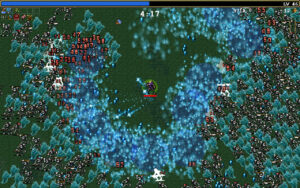
Maybe this is just the ol’ ADHD talking, but I usually want games that are a little more brisk than your average JRPG. When I think about The Perfect Video Game, I imagine something that follows in the footsteps of Pac-Man or Tetris, something that has that quality of instantly engaging with the thing that games have that no other form of media does: interactivity. Hell, if we’re being honest with each other here, when I think about The Perfect Video Game, the game I think about is Vampire Survivors. It’s fast and simple and still has depth and secrets, but the moment-to-moment gameplay is just built around the single idea of move, punctuated by moments of some incredibly smooth-brained decision making. Numbers go up, lights flash, it looks like Castlevania and plays like Pac-Man, and while there’s no story to speak of, the bestiary has some fantastic jokes in it. Seriously, if you’ve never gone and looked at it, go give that a read. Whoever wrote and translated it did a fantastic job.
Persona 5, meanwhile, was a game that I had to start three different times because I kept just bouncing off of it due to what I would generally consider to be a major structural flaw: you don’t actually do anything for like the first six hours. There’s an exciting opening where you’re heisting a casino with some tutorial battles and summoning your Stand Persona and busting through windows and facing off against an army of cops and getting thrown down to the pavement and dragged into an interrogation room where you’re kicked and drugged by crooked cops (aka: cops) and read a list of all the crimes that you’re about to commit when the game shifts from the framing sequence to the flashback that’s going to make up the bulk of the narrative, and then…
And then…
You press a button.
To advance dialogue.
And then you go to school.
And press a button.
To advance dialogue.
And that’s all you do.
For like three hours.
People give the Pokémon games a lot of guff for having an unskippable “let me teach you how to catch Pokémon” tutorial in every single installment, but a) those games are all for babies and those of us who have been about that life since 1998 are the weird ones, and 2) at least you can bust through it and be catching whatever this game is trying to pass off as not just being a regular pigeon while there’s still daylight. Persona‘s over here Gamers Edge-ing you for the better part of a weekend before you can even start thinking about adding Justabird to your team.
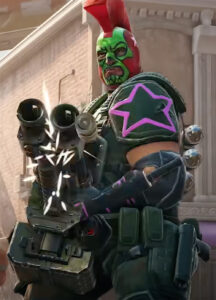
Compare that to the game that’s probably its closest competition for being my favorite: Saints Row the Third. I’ve described SR3 as being made entirely of missions that would be the final level of any other game, and that starts immediately. Before you even get to character creation, the tutorial level of that bad boy involves robbing a bank by tearing the entire vault out of a building and riding it while it’s dangling from a helicopter, being kidnapped and put on a private jet, escaping by jumping out of the jet, jumping back into the plane to get a parachute, jumping out again, and having a mid-air gunfight with an army of enemies, all while you get some generally well-done, entertainingly silly dialogue. The second mission, in which most open-world games would give you a shotgun to ease you into combat, instead introduces its weapon system by giving you air strikes. That is a mission statement. That is how you start a video game that wants you to enjoy the way it wastes your time.
Sadly, no project featuring the voice of orange racist Terry “Hulk” Hogan — as a luchador, no less — could be my favorite anything.
As a result, I bounced off Persona 5 twice, and only decided to grit my teeth and eat my JRPG vegetables after I’d tried the action-oriented musou spin-off, Persona 5 Strikers, and only then because I loved the designs and had been assured by the person who bought P5 for me in the first place that once I got into it, I would love it. Which, of course, wound up being correct.
Even after I finally got past that first hurdle, though, and got into the rhythm of its flashy, stylish combat — which, to the game’s credit, really does just feel good — I found myself frustrated by… well, everything else.
If you don’t know, and thanks for bearing with me for this long if that’s the case, the Persona games are split between two halves. One is the dungeon-crawling, monster-fighting, psychedelic JRPG stuff, and the other is a sort of student life sim where you go to school, talk to your friends, maybe get a part time job, and otherwise just Live An Honest Student Life. Like, that’s actually verbatim the mission objective you get at a certain point of the game. And buddy, I might like a good JRPG even if it’s not my favorite genre, but life sims? Despite my name, that’s gonna be a hard pass, friend.
Admittedly, I love a Stardew Valley — what’s not to love about a game where I can live the fantasy of having skills that actually contribute to society and it’s Christmas every four months? — and I like interacting with characters and building relationships with NPCs in plenty of other games. Persona, though, isn’t a game that allows you to use those interactions to build or flesh out your character. Not really. Instead, every interaction that you have with someone has a definitively right and wrong answer, and whether you give the right answer determines whether you’re penalized, or at least not rewarded, in the rest of the gameplay. Characters that you form a bond with enhance their abilities combat, or allow for you to get stronger attacks and higher-level personae. Characters you don’t just… don’t.
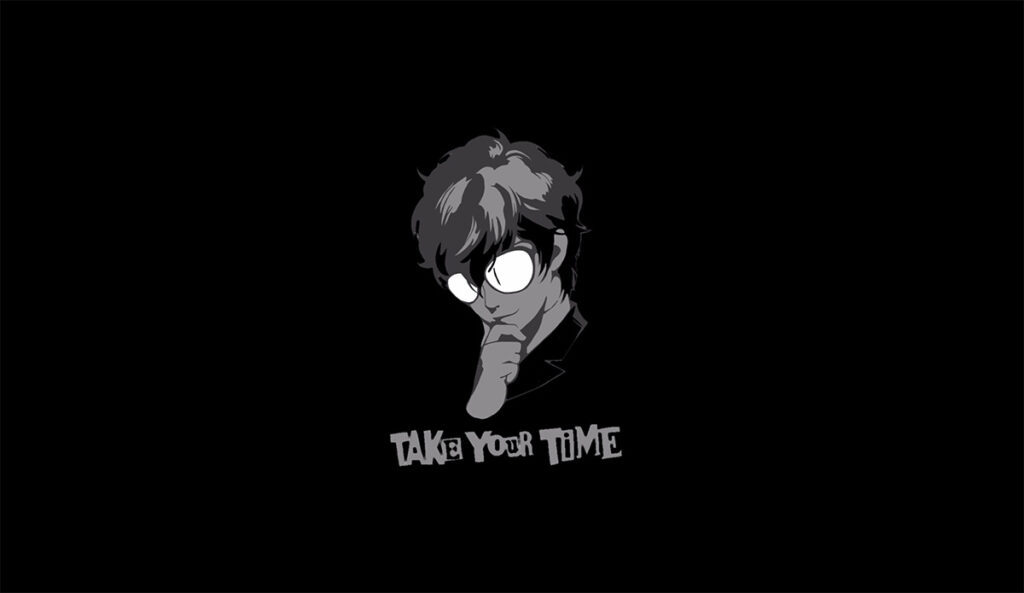
That’s by design, too. One of the game’s catchphrases, which shows up on the loading screens, is “Take Your Time,” and it means that in a very literal sense. Outside of the requirements of going to school and certain scripted events that happen on schedule, you mostly determine how you want to spend your days, taking your time as a terribly taciturn Tokyo teen. It’s part of the entire point: figuring out how to manage what you do on each day, who you choose to spend time with, what skills you want to work on developing, how you want to prioritize your Phantom Thief missions. From a storytelling standpoint, it’s effective, too; when you’re cut off from those activities, it’s very noticeable, and when you miss an opportunity, you feel like you really missed something in a way that you don’t really get from a lot of other games, especially when they’re built on grinding for XP in dungeons.
That would honestly be fine, I think — I wouldn’t love it, but I’d get it — except that the choices you’re given in how to interact with people aren’t always intuitive, and in fact are often resoundingly counter-intuitive. Maybe it’s a thing with the translation or a cultural difference from Japan to America, but I feel like you would do just as good rolling a die to determine how to talk to the characters in this game. It’s usually less about defining who your character is themselves — like you would in, say, a Mass Effect — and more about telling an NPC what they want to hear at any given moment. Except when telling them what they want to hear is the wrong choice and you have to Get Real with them, which seems to happen at random.
Take, for instance, my pick for the most annoying sequence, which involves your classmate, Mishima. Mishima very quickly figures out that his school chums are spending their evenings rockin’ like Dokken as a bunch of Dream Warriors, and appoints himself as your social media manager. This tiny amount of power quickly goes to his head, and he winds up going through a whole thing where he becomes just as bad as the people he’s hated all his life for abusing their power over him. The story itself is actually pretty good, I like Mishima as a character and think his arc is both interesting and a really distressingly relatable story of being a teenager who attaches himself like a remora to the cool kids in order to experience the tiniest bit of secondhand clout. The problem here is me.
Well, not me, but the main character, Joker, and not even Joker himself, but the way Joker’s interactions with Mishima have to go in order to advance this story. In every section, you’re given the chance between essentially telling him “hey, slow down there buddy, you’re getting a little weird about all this” and “wow it’s so cool that you’re the most important member of the team and we couldn’t succeed without you and it’s awesome that this microscopic bit of authority has turned you into a nightmare bully who has grown to resent his friends for doing the things you can’t. That’s rad!” If you don’t choose the latter, if you try to be, you know, a normal person to Mishima and help steer him away from making the worst possible choices, then it’s going to take exponentially longer to go through his story arc than it will if you enable him, and then flip and act like you weren’t part of the problem all along once he reaches the end. Which, I suppose, is also a distressingly accurate recreation of the teenage experience, albeit not one I’d like to recreate for fun.
And again, this is thematically appropriate. The game uses the visual language of masks and, obviously, the Personae that we take on to interact with others as its primary metaphor on pretty much every level. The main character’s special ability is even that he can use any number of different Personae, while everyone else is limited to just one. With that in mind, it makes a lot of sense that Joker would function as a bit of a social chameleon who often tailors his responses to match the person he’s talking to rather than his own views. The problem is that idea of presenting it as a definitively right and wrong choice, where one option progresses things and the other means you’ve wasted your limited time, and not really giving you an idea of how to make that choice in a way that feels natural.
All of this, of course, is technically optional, but in a game that’s so heavily story-driven, experiencing the story is as much of a primary motivator as Dealing Damage To The Bad Guy. I’m not saying that they needed to color code the dialogue options or have “Mishima didn’t like that 🙁” appear at the top of the screen (though they do actually kind of have that, now that I think of it), but when success in a conversation actually affects both narrative and gameplay, then it helps if the way to succeed is the one that feels like it makes sense. It’s not like there are other shades of interaction, either. You either progress the story along its predetermined path or you don’t, largely because you’ve got like 23 of these arcs to play out and having them branch off based on nuances rather than a static number that goes up when you say The Right Thing is both complicated to the point of impossibility and not even really something I’d want if I could have it.
The end result of all this is that it’s the kind of game that you need to play with a guide open on your phone the entire time, or else you’re just getting a vastly inferior version of the game — not different, really, just worse. I am by no means an expert, but that just seems like poor game design. You want a video game that teaches you how to play it — that ol’ Super Mario Bros. World 1-1 saw, right? — but with this one, if you don’t have the answer key in front of you, it often feels like you might as well be throwing darts at a list of responses. The only thing good about it is that it allows you to consistently choose to be an absolute jerk to Akechi, which I would encourage you to do because he sucks and his vibes are absolutely rancid from the second he appears on the screen. I hate him like I have never hated another video game character, and not in the “I want to fight this guy” way. I hate him in the “go away and stop talking about how we’re rivals or whatever, the only part of your redemption arc that I care about is that you die in it” way. Bro has X-Pac heat and I do not understand why so many people want to see him and Joker kiss. That dude just sucks.
Right, the storytelling and the problems with advancing the narrative. It’s a shame, because I actually really do love how almost all of the stories play out, even when the game decides to throw you an option for romance that it really, definitely shouldn’t. Joker’s teacher Kawakami, for instance, is one of the true highlights of the game just for being an absolute disaster of a person who literally lies to your face about having a dying relative in an effort to get money. She’s just awful in the most delightful way, and when you find out why, it adds just the right amount of pathos to her comedy. Her story of idealism being crushed by greed and self-loathing and being built back up into a better person is absolutely fantastic, if you, uh, ignore the part where she’s a potential love interest for her 15 year-old student.
In fact, after all this griping, I’d say that the actual story and writing of Persona 5 is almost as unassailably great as its visual design choices, even to the extent that they’re often flawed (or at least weird) in the same ways. The simple idea of what it would mean to take the worst person you know and confront them on an undeniable level with the knowledge of why the things they do have hurt people, to go into the core of who they are and make them understand, is one that’s endlessly fascinating to me. As someone with an anxiety disorder, the idea of inflicting empathy on someone as a punishment is both an intoxicating power fantasy and a moral quandary. Is it worth making a bad person into a good one if you have to put them through a mental hellscape to do it? Does changing someone to that extent allow for redemption? Is a person defined by their most selfish impulses? Is it right to use empathy as a weapon? How much suffering are you allowed to cause, and does that change when the person has caused their own share of it? Who deserves mercy, and is it really mercy if you need to deserve it?
These are the explicit, textual questions that the game asks through its cast of high school juniors in weird outfits, and while it doesn’t have answers for all of them, it does have a philosophy that’s very concerned with what it means to exist in community with other people that it makes literal over the course of its story. Persona 5 is rooted in the idea that not caring who you hurt is the undeniable source of the greatest evils in history, that it’s what the failures of our society are literally built on top of, that it’s the thing you have to struggle against because deep down, all we have is each other, and all we can ever do is watch out for the person next to us and believe that they’ll do the same. It’s a world where the greatest evil isn’t gleeful malice or even ignorance, it’s just not caring. The literal final boss of the game is the concept of Apathy given a physical form.
And then you summon the Devil and shoot it in the face.
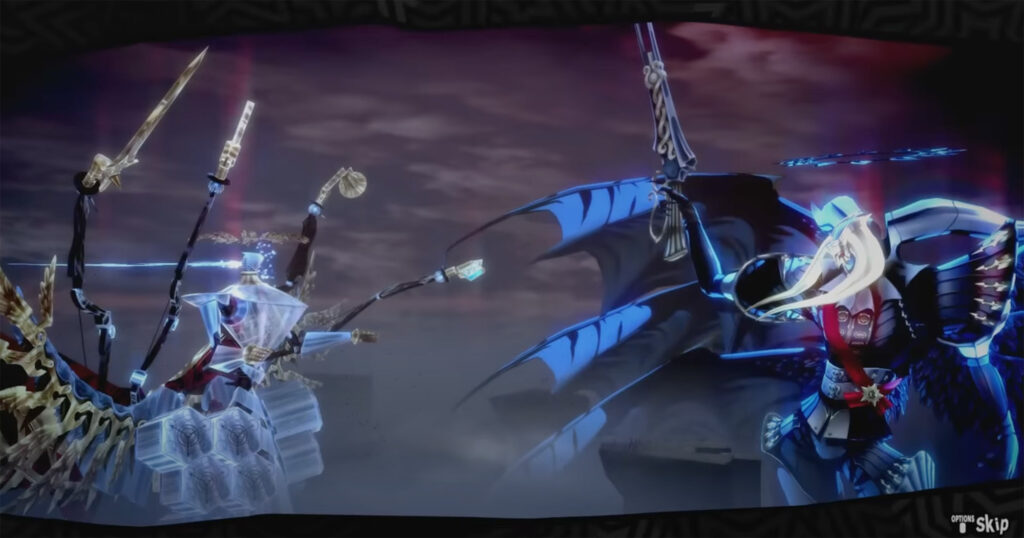
Without question, this is the single best ending that any video game has ever had, to the point where for all its improvements and additions of stuff I like, Persona 5 Royal actually makes the game a little worse by adding an extended epilogue and “true ending” with another boss. It’s still great, but the kaiju-sized embodiment of rebellion showing up to just obliterate the concept of not caring about people is unbeatable. Also it happens on Christmas Eve.
That is, morally speaking, my jam. That’s Kirby. That’s Morrison. That’s the best statement of philosophy that I’ve ever seen in a video game, and probably one of the best ones I’ve seen any piece of pop culture. Years and years ago, I had an idea for a story about super-heroes who entered the collective mindscape to literally fight against Bad Ideas, but I don’t need to do that anymore, because Persona 5 exists and did it better than I ever could with the same moral core that I would hope to but worry I wouldn’t have the skill to convey. I think about this moment every single day of my life. No joke.
So that’s the answer, right? If my problems are with the gameplay but I love the story that much, then that’s what makes it my favorite game. Easy. 1700 words of agonizing at the top of the page here and I could’ve just skipped to the part where I talked about devil guns and Satan bullets. Except that I don’t think that’s it.
If it was just the story, then why didn’t I like the anime version as much? It’s as close as you can get, with some sequences that are taken directly from the cutscenes in the game. Basically the same thing, right? No, not really. Why didn’t I love the manga adaptation? I like video games a lot, but generally speaking, I like comics more, so you’d think that put side by side in a way that just let me get through the story without having to figure out how to progress it, that one would work just as well. It doesn’t.
There’s something about this story, in this medium, for all its flaws and annoyances and those two weird homophobic caricature dudes who show up twice for some reason that add nothing to the game but the need to have a qualifier when you talk about how great it is, and how it comes together with some kind of alchemy that I just can’t get my head around.
It’s tempting to say that it’s the interactivity, because that’s what games have that nothing else does, and Persona 5 does a lot with that, sure. I absolutely love that when you shoot apathy with your Caring About Others Gun, the game actually makes you choose the attack and then press the shoot button the way you’ve been doing for the entire game leading up to it, because that’s such a wonderful touch that makes you, the player, an active participant in its philosophy. But it’s not like there’s any other option in that scene, there’s no actual choice there. And like I said, so much of the rest of the game involved looking at a wiki to find the correct dialogue choice even when I was pretty sure I knew what it was, so the interactive element is about as strong here as it is in Phoenix Wright, The Game That Is Basically Just A Book™. I love it, but you don’t lose anything if you take away the choices.
So yeah, the interactivity is part of it. The story’s a big part of it. The character designs, the RPG gameplay — which is actually really fun even if I don’t have as much to say about it — the voice acting, the fascinatingly bizarre designs of the Personae, the relationships that are structured as literal social contracts. It’s all of that. It’s everything, it’s the magic of how it’s put together in a way that I could spend a year dissecting and still not really understand. It’s that I can’t understand why it works, I just know that it affects me on a level that’s both beneath and beyond that. It’s the magic trick that I just can’t explain, where it might not be the best, but it’s the best one for me.
I think it might be my favorite game.